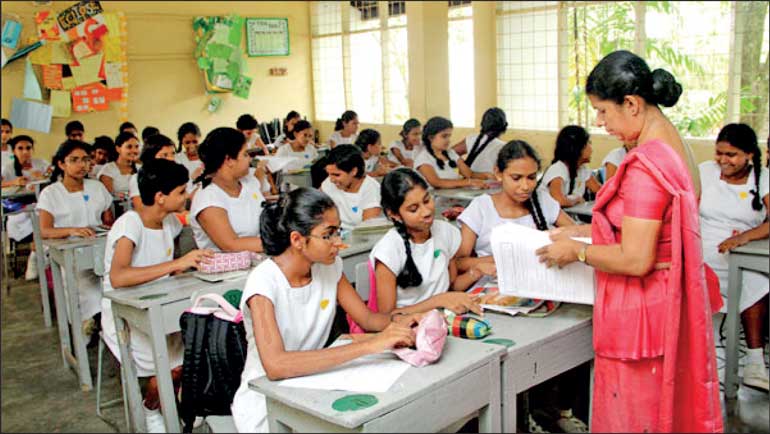Wednesday Feb 25, 2026
Wednesday Feb 25, 2026
Wednesday, 8 October 2025 00:28 - - {{hitsCtrl.values.hits}}

The ban immediately undermines the authority of teachers and parents, replacing traditional respect with what is perceived as a permissive legal framework
 The amendments to Sri Lanka’s Children and Young Persons Ordinance (CYPO) and the push for a new comprehensive “Compact Act” are being hailed as long-overdue reforms, aligning the nation with international child rights conventions. Yet, beneath the veneer of progress lies a profound anxiety: will these rights-centric laws, particularly the outright ban on corporal punishment and the shift toward rehabilitation, inadvertently dismantle the traditional mechanisms of discipline that underpin Sri Lankan society?
The amendments to Sri Lanka’s Children and Young Persons Ordinance (CYPO) and the push for a new comprehensive “Compact Act” are being hailed as long-overdue reforms, aligning the nation with international child rights conventions. Yet, beneath the veneer of progress lies a profound anxiety: will these rights-centric laws, particularly the outright ban on corporal punishment and the shift toward rehabilitation, inadvertently dismantle the traditional mechanisms of discipline that underpin Sri Lankan society?
A growing chorus of critics—from concerned parents and overburdened teachers to social conservatives—argues that these reforms are being enacted without adequate preparation, threatening to unleash a wave of juvenile indiscipline that the State is ill-equipped to manage.
The discipline deficit: When the rod is spared
The most immediate and controversial change is the explicit repeal of the section of the CYPO that permitted the use of corporal punishment by parents and teachers. For generations in Sri Lanka, as in many South Asian nations, the principle of “spare the rod, spoil the child” has been central to moral and academic instruction. Discipline, enforced through firm action, was seen not as abuse, but as a form of moral care (“metta” in Buddhist thought).
The negative ramification, according to sceptics, is the creation of a “license for indiscipline.”
The flip side: Excessive punishments and the impact on children and adolescents
 Proponents of this piece of legislation and those initiators in the NPP Government argue that long enough have we had archaic child rights statutes and we must move with times and in tandem with “developed” societies. Definition of development apart it is a fact that there have been and continue to be excessive punishment of children in schools, public humiliation and abuse Not only in schools but at home fronts as well. This requires stringent preventive laws and deterrent punishments. However are we jumping into a fire from a frying pan? Are we being too liberal?
Proponents of this piece of legislation and those initiators in the NPP Government argue that long enough have we had archaic child rights statutes and we must move with times and in tandem with “developed” societies. Definition of development apart it is a fact that there have been and continue to be excessive punishment of children in schools, public humiliation and abuse Not only in schools but at home fronts as well. This requires stringent preventive laws and deterrent punishments. However are we jumping into a fire from a frying pan? Are we being too liberal?
Readiness: Are parents and teachers equipped?
The efficacy of the new laws hinges entirely on the readiness of the two most crucial groups: parents and teachers. Current data suggests they are dangerously unprepared for the cultural revolution mandated by the legislature.
Parental confusion and anxiety
For the average Sri Lankan parent, the sudden prohibition of physical discipline causes immense confusion. There has been a clear failure by the state to launch comprehensive, nationwide public education campaigns to teach alternative, positive parenting skills.
Instead of being empowered, many parents now face a triple dilemma:
1.Legal fear: Fear of being reported and prosecuted for disciplinary actions traditionally considered normal.
2.Disciplinary void: Lacking the skills to manage severe behavioural issues without firm measures.
3.Moral anxiety: Concern that their children will grow up lacking the discipline and obedience necessary to succeed in a highly competitive society.
The teacher’s dilemma in schools
The burden of maintaining order in overcrowded public schools falls squarely on teachers, who are already stretched thin due to administrative loads and insufficient resources. Research indicates that many teachers view the “form and severity” of corporal punishment as the issue, not the act itself, suggesting a fundamental disconnect with the legislative intent.
Teachers argue that without the fear of sanction, student defiance will surge, leading to:
Resource shortfall: The ultimate policy failure
Beyond cultural resistance, the proposed reforms suffer from a crippling resource deficiency. Moving the juvenile justice system from a punitive model to a rehabilitative one is extraordinarily expensive.
The new law promises that minors will be placed in specialised institutions focusing on rehabilitation. However, Sri Lanka currently lacks the required specialised facilities, trained social workers, and psychological experts to handle the influx of 16-to-18-year-olds removed from the adult prison system. The practical risk is that these young people may simply be shuffled into understaffed, ill-equipped remand homes, or worse, released into communities without necessary support, creating a public safety risk.
This failure to provide the social scaffolding necessary for the law to succeed makes the entire exercise vulnerable to criticism that it prioritises international optics over domestic reality.
Credibility: A child rights compact or a political gimmick?
Given the immense challenges, the critical question remains: is the push for this rapid, sweeping child rights reform driven by genuine national interest, or is it a calculated political manoeuvre?
While child protection activists have long championed these changes, the timing—often coinciding with governments seeking international legitimacy, as evidenced by the IMF push—invites scepticism. The NPP (National People’s Power) or any incumbent government, stands to gain significant political capital from championing a popular, internationally supported human rights agenda.
The most cynical interpretation suggests this is a calculated political gimmick designed for future electoral benefit. The children currently being empowered by this legislation will be the voting block of tomorrow. By positioning themselves as the saviours of child rights, the current political establishment is potentially cultivating the loyalty of a new generation of voters who will hold a favourable view of the party that abolished corporal punishment and granted them greater autonomy.
If the “Compact Act” is enacted but fails to receive the necessary funding for implementation—if teachers remain unsupported, and rehabilitation centres remain empty promises—it will confirm that the reform was less about securing the child’s future and more about securing the politician’s vote. The true measure of the Government’s sincerity will not be the law passed in Parliament, but the Budget allocated to the child protection and social welfare departments in the years to come.
(The writer is a senior management professional and HR thought leader/transformational expert with extensive multidisciplinary exposure across industries and social groups.)